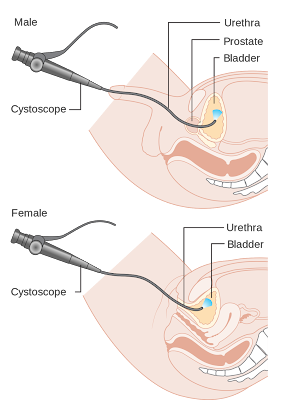What is a Cystoscopy?
A cystoscopy is the gold standard test to rule out bladder cancer .
If there is blood in your urine, eventually you will get a cystoscopy,
or you should be sure to ask for one if they are not forthright to give
you one. Even if a CT or ultrasound comes back negative for cancer, you
should still get a cystoscopy.
If you are going in for a Cystoscopy - bring someone!!! After you read about my experience found in the article below, you will understand why. It's for support, in case you find a tumor. Write down potential questions beforehand. Let your support person know, they should be ready to ask questions, and write down answers. If a tumor is found, believe me, you will not be in a position to understand or remember anything that is said, after you hear the words tumor or cancer.
Article: Cystoscopy, Cancer, and What to Expect
First off, lets talk about what a cystoscopy is.
A cystoscopy (sis-tos-ko-pee) is a procedure that allows your doctor to examine the lining of your bladder and your urethra, which is the tube that connects to your bladder and carries urine out of your body.
Many people call a cystoscopy a cysto, for short.
A hollow plastic tube called a cystoscope or resectoscope is passed through the urethra and into the bladder. It is equipped with a camera lens, light, and a hollow tube that can pull urine out, and also put saline in (saline is a sterile liquid made up of water and salt. It mimics fluid found in our body like tears). The saline is used to to enlarge the bladder and help visualize everything.
The saline is also used to help get a good urine sample for a urine cytology. When your doctor is doing the cystoscopy they will spray saline in your bladder, pull out urine and spray it back in again. They will try and agitate the cells in the lining of the bladder. They want to get as many cells in the sample as possible, so if there are any cancer cells, it would be obvious to find them. Your doctor is doing this usually without you even realizing he/she is. It doesn't hurt at all, and it's done very quickly.
Article: Urine Cytology and Bladder Cancer
A cysto can be done outpatient at your doctors office, done as an outpatient procedure with sedation, or under general anesthesia (like when you have a TURBT).
Article: What to Expect with a TURBT
What is the Difference Between a Flexible and Rigid Cystoscopy?
From my experience, most cysto's are done in an exam room at your urologists office.
An outpatient cystoscopy, like the one done in your doctors office, is done with what's called a flexible cystoscope. It's much smaller and more flexible than the one that is used during a TURBT surgery. It's made of plastic so it's flexible. Above you can see a picture of a flexible cystoscope.
The
cystoscope/ resectoscope used during a TURBT is called a rigid
cystoscope. It's very rigid, made of metal, and much larger, allowing
for more instruments to be used (for burning, for cutting, and
retrieving the tumors). The above picture is of what a rigid cystoscope
looks like.
For an in-office cysto, they start the visit like any other urologist visit. They will ask you a few questions about your urinary system (have you seen any blood, pain, urgency, frequency, while urinating etc.), take your weight, maybe some vital signs, pee in a cup.
Also, you might be given a one-time dose of an antibiotic, that is what my urologist oncologist does for me. It's to help prevent a UTI (urinary tract infection) from developing after the cysto.
They will have you sign a paper (called informed consent) that says the doctor has educated you on what to expect with a cysto and the risks and benefits of doing it. As you will see below, my first urologist, Dr. B. did not do this.
My current doctor, Liam McLeod always takes the time to answer questions and educate me on everything going on. Please choose your doctors wisely! This is a REALLY long battle. You want a good doctor working for you, and one that you like and one that you trust. You can choose your healthcare providers, and can change them at any time as well.
Article: What Type of Doctor Should I Choose for Bladder Cancer Treatment?
If you want more information about a cystoscopy and what to expect please read the article listed below.








No comments:
Post a Comment